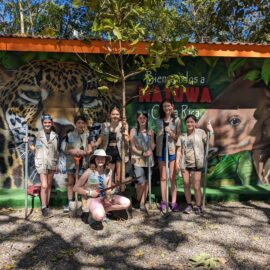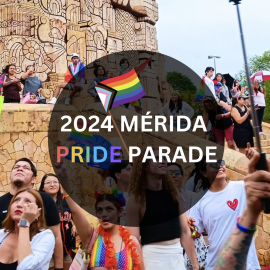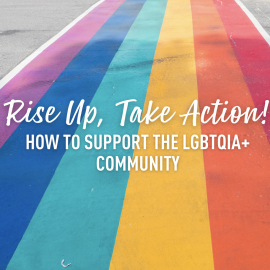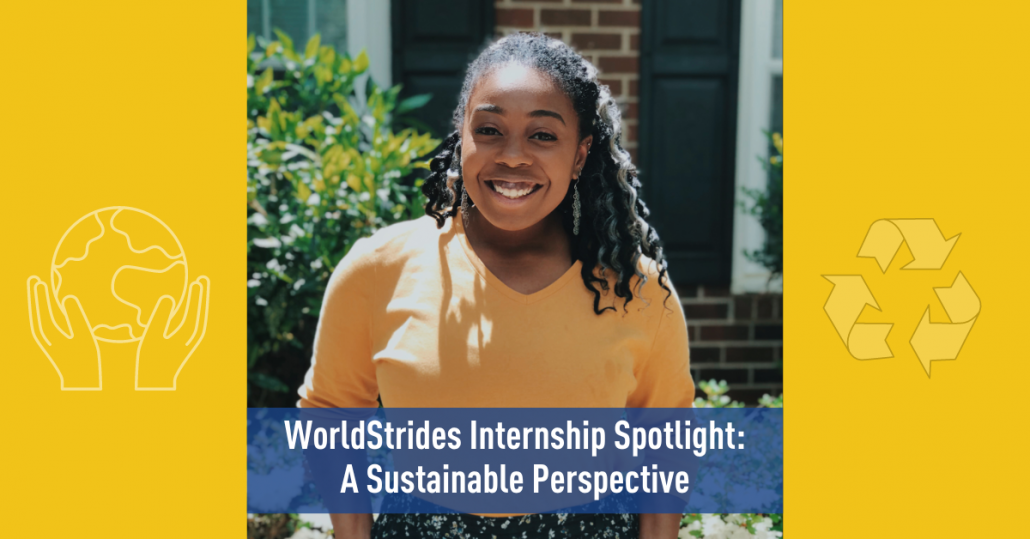WorldStrides Updates
WorldStrides Internship Spotlight: A Sustainable Perspective
By WorldStrides Intern, Paris Woods.
One of the many goals of WorldStrides is to highlight the unique stories and perspectives of its many team members. As part of the WorldStrides Professional Internship Program, recent graduate Paris Woods shares her experiences and her thoughts about her time working with WorldStrides and the impact it is having on her future. Paris graduated in 2021 from James Madison University with a bachelor’s degree in Justice Studies with a Social Justice and Interventions concentration, and minors in Political Science and Nonprofit Studies. Currently, Paris is WorldStrides’ sustainability intern for the summer of 2022 in the Corporate Social Responsibility (CSR) department.
How did you find the WorldStrides Professional Internship? What led you to begin an internship here?
Originally, I thought I would graduate college and immediately start my master’s program. I had applied to a few programs and had been accepted to a few schools, but when it came time to decide, no one school felt like the best next step for me. So, I decided not to go. I was unsure where the road would take me, but I started to view my life in phases. I wasn’t going to Graduate School, but I was about to spend three months working at an overnight summer camp; and staying present to soak up every one of those moments meant more than figuring out what would come next.
After the Summer of 2021, I moved home, beginning the process of finding a job. Days turned into weeks that turned into months filled with redirection letters and a portfolio of one-hour connections with strangers in interviews that resulted in dead ends. Discouraged only scratched the surface of the emotions I felt. Mixed in with the emotions that did not make me feel so great was the urge to take accountability for not having some of the technical, practical, and applicable tools to be considered a ‘competitive candidate.’ This conclusion presented a new opportunity to expand my search to paid internships.
It’s funny because I was reading a book about Corporate Social Responsibility (CSR) a few months before finding the WorldStrides Professional Internship. A mentor of mine, based on my passions and experiences, mentioned that I could really pour into this field. If anything, it would give me another set of key words to plug into my LinkedIn job search, but fortunately, it provided much more. Through a LinkedIn post I found the internship posting and after reading it, I decided to apply; excited about the potential opportunity to engage in a multitude of areas within a company.
My interview happened to be with my now mentor, Molly Laycob, and I remember the ease, excitement, and transparency I felt throughout that hour. We discussed our mutual love for travel, the importance of CSR and my growing enthusiasm for Sustainability. I had many interviews with incredible employers; however, I am truly grateful this interview resulted in a hire.
Given your recent efforts in promoting sustainability, why should we choose to be sustainable?
The WorldStrides CSR department has a saying, “there is no social justice without environmental justice.” Though we are not solely to blame, it is imperative to understand we are products of our ancestors who felt capitalism and natural resources were indefinite, when in fact, we are quickly learning these are finite resources in our increasingly globalized society.
When thinking about why we should choose to be sustainable, I recognize that decision was not made within the last 10-15 years. Environmental consciousness has existed for decades: spearheaded by black, brown, and indigenous communities who have demonstrated that the intention of our existence was to be within nature and of nature, not stripping it of its biodiversity for self-preservation.
I had the opportunity to take an Environmental Justice class as part of my studies at James Madison University. Through this course I gained a respect for traditional agricultural practices and believe they should be fully celebrated and incorporated into how we choose to become sustainable. The intersectionality of social, environmental justice, and even food justice is so paramount that it is impossible to ignore when attempting to establish equitable and just change. Practicing sustainability is the acknowledgement of privilege and recognition of the disproportionate environmental risks that people experience based on class, gender, and race; it is allyship in true form when we take the time to practice sustainability.
What is WorldStrides doing to be more sustainable and how are you helping in those goals?
Sustainability does not seem easy because it does not feel accessible. A key step WorldStrides has taken in its contributions to sustainability is allocating resources to hire someone who represents and implements the company’s sustainability initiatives. These include ensuring our company is as low waste as possible: recycling bins in WorldStrides’ offices, composting opportunities where appropriate, community culture of reusing mugs, and generating minimal paper products as possible are just a few internal methods incorporated to create a more sustainable WorldStrides.
The ‘Fill it Forward’ initiative is one of my absolute favorite sustainability initiatives spearheaded by the Head of Sustainability at WorldStrides, Molly Laycob. This partnership not only encourages and increases the number of individuals using reusable water bottles, but also partners with community members to bring awareness to climate change and an opportunity to reflect on how we can better treat our Earth.
One of the projects I have worked on this summer is a comprehensive partnership opportunity research outline. WorldStrides is a company that sends thousands of eager students and employees abroad each month. Part of our goal of becoming an environmentally conscious organization is the recognition that without sustainable partnerships in the states and around the globe, our reach will remain limited. Over the last few weeks, I have delved into various regions to find local, sustainable, and environmentally conscious organizations, companies, and travel guides that WorldStrides can partner with. These include no-waste hostels and living accommodations, travel companies that meticulously plan trips through a sustainable lens, and even restaurants that promote sustainable waste initiatives to produce a circular economy within their community. This is how WorldStrides can work towards becoming a carbon-zero company.
What do you hope to see in terms of sustainability in the future?
Our modern interpretation of the environment was not essential to the creation of our planet. Natural resources that we have grown to take advantage of—tress, grass, native plants, rivers, and oceans that span our Earth’s landscape, while essential, did not serve a purpose aside from being. Over time, discourse began assigning meaning to Earth’s natural state eventually leading our environment into a social construct: something that needed management, social meanings assigned to the world, and a group to benefit from having power within this construct.
The goal of the environmental justice movement is to provide universal environmental equity to all groups—ensuring that no group bears disproportionate effects of our growing global climate change dilemma. Committing to sustainability is also committing to conversation, inclusion of communities and incorporation of traditional practices that have been found to not only help our environment, but create opportunities for thriving ecosystems and inadvertently, people.
As a black woman in sustainability, describe your feelings, goals, aspirations for your community and yourself. What would you want people to know?
From a number’s standpoint, black and brown individuals and those below the poverty line statistically live in more ecological sacrifice zones than any other demographic. These are areas particularly close to heavy pollution, poor access to safe drinking water, and often lack fresh food and produce, which is known as a food desert. The disproportionate impact climate change has on those that I share cultural ties to is disheartening; especially when learning that these are the most impactful groups when it comes to mitigating the effects of climate change.
As I hope to grow in the field of sustainability, my mission is to amplify. I have such a respect for traditional agricultural practices and the intentionality of humanizing what has been harmful political discussion. I want community gardens to exist because we deserve the right to healthy and culturally appropriate foods in our communities; not to be marginalized communities living within food deserts without access to fresh produce. I hope to move away from brushing off sustainable ideas based on the assertion that they are ‘too optimistic’ and ‘impractical’ in our current economic and political system. There are ways to incorporate sustainability, climate, food, and social justice into our everyday practices; we just need to pull out a chair at the table of discussion for those whose voices have been routinely shut out.
Climate change affects all of us. Though I speak from the lens of a Black woman because that is how I view the world, I do not place the responsibility on the shoulders of one group, gender, or class. The whole purpose of justice is to create a system of equity where responsibility is equally shared, valued, and respected. There are steps to take that as a society we often fall short of, but one of the first steps is just making sure everyone is in the room. What is your experience? If climate change has not physically shown up in your life, I want to know that! Why do you think that is?
Closing Remarks
At the end of her remarks, Paris left one final thought, “I truthfully don’t know if I’ll ever find the ‘right job’ for me. Finding WorldStrides has granted the opportunity to explore every aspect of what I am passionate about right now: travel, kids, sustainability, and justice. This internship is as uniquely complex as myself and I absolutely love it. Though I do not know what job I will eventually settle into, I hope the future me never gets scared to stand firm in this complexity ever again. I hope she is okay with the ebbs and flows of her life and is willing to step into what genuinely makes her curious.”
As Paris continues her professional career after the conclusion of this internship, we look forward to seeing where her passions and goals will take her. WorldStrides is continuously striving to be more sustainable in all aspects of its business and to teach the value and importance of sustainability through its many programs.
The WorldStrides Professional Internship Program is dedicated to the promotion and development of the same skills and objectives of all WorldStrides’ travel education programs and opportunities, “…to enable interns to see beyond the workplace and to see the world -and themselves- in new ways.
For more information about WorldStrides and all that we offer, visit us as www.worldstrides.com.
Related Articles

The 2024 WorldStrides Student Photo & Video Contest Gallery
By WorldStrides Intern, Paris Woods. One of the many goals of WorldStrides is to highlight the unique stories and perspectives of its many team members. As part of the WorldStrides Professional Intern...

Girl Scouts: Costa Rica Tour
By WorldStrides Intern, Paris Woods. One of the many goals of WorldStrides is to highlight the unique stories and perspectives of its many team members. As part of the WorldStrides Professional Intern...

2024 Mérida Pride Parade
By WorldStrides Intern, Paris Woods. One of the many goals of WorldStrides is to highlight the unique stories and perspectives of its many team members. As part of the WorldStrides Professional Intern...

Rise Up, Take Action: How to Support the LGBTQIA+ Community
By WorldStrides Intern, Paris Woods. One of the many goals of WorldStrides is to highlight the unique stories and perspectives of its many team members. As part of the WorldStrides Professional Intern...


